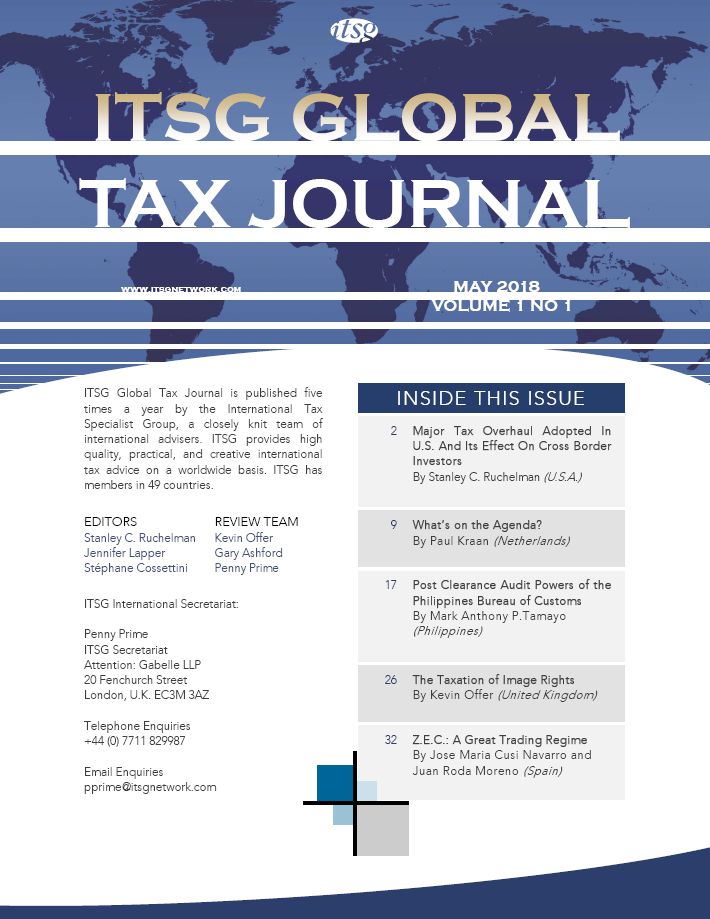Introduction
It is broadly known that territories called “D.O.M.”s (in French, Département d’Outre-Mer, which roughly translates to “overseas land”) are islands that provide tax incentives as a way to attract foreign investment to compensate for their distance from the continent. This would be the case for the British Virgin Islands, the Channel Islands (Jersey and Guernsey), the Isle of Man, etc. The problem for these islands is that most of them are labelled by many countries as tax havens and thus give rise to anti-avoidance provisions and other adverse tax consequences.
It is also important in this changing and challenging world in which we live and work to have as much certainty as possible. It is public knowledge that the European Commission considers that many companies in Ireland should pay billions of Euros because of an abuse of the attractive Irish trading regime. This has arisen from counting on the blessing of the Brussels authorities to avoid unexpected large tax liabilities and a desire for E.U. based solutions which are more convenient than trading regimes in non-E.U. countries such as the Fribourg or Zug canton based Swiss companies.
Moreover, sharp tax planning does not only require a spreadsheet showing a low tax burden, but also consideration of substance with regard to the B.E.P.S. regulations such as to consider the quality of services and infrastructure and to have employees motivated.
So, if a company seeks an attractive trading regime, but not in a tax haven island, a stable and reliable E.U. jurisdiction approved by the European Commission, a place employees will want to work in, well connected infrastructure and geographically convenient as an alternative to companies engaged in business within Africa (e.g. oil, gas, mining companies, etc.) then there is one suitable solution: the Canary Z.E.C. regime.
Z.E.C. stands for “Zona Especial Canaria”. The Canaries are a group of seven extremely beautiful islands1 with mild weather the full year-round. The islands belong to Spain and thus can claim all Spanish tax treaties2 (96 at the moment) as well as all the European Directives. The islands are geographically located west of the north of Africa.
Advantages of the Canaries Z.E.C.
The remarkable thing about the Canaries, besides the aforementioned climate, its beautiful cities and wonderful beaches is that the islands are well connected to Spain and the rest of continental Europe by air (e.g. 4 daily flights to London). They are also well connected to Africa.
Tax wise, subject to fulfilling certain requirements addressed later in this article, a company operating under the Z.E.C. regime can benefit until 20263 from a 4% tax rate and a 90% reduction of the tax base.
Moreover, unless the shareholder is resident in a country or territory statutorily classified by Spain as a tax haven, as long as a simple threshold is met consisting of a 5% and one-year shareholding in the company in the Canaries, no dividend withholding tax applies to profits distributed to the shareholder.
Brief Summary of the Applicable Requirements
In order to qualify for the Z.E.C. regime, two groups of requirements must be met:
- Formal requirements; and
- Substance requirements.
Formal Requirements
In order to qualify as a Z.E.C. company, there is a mandatory registration process to go through. The first step is to qualify the business activity intended to be carried out in the Canaries. To that purpose there is a long list of approved business activities which only excludes those that do not require a geographical link to the Canaries (financial activities being excluded in all cases). Once the business purpose has been determined it is necessary to register the Z.E.C. company in a special registry4, which requires the prior formal approval of the Consejo Rector (Governing Council).
To proceed with the registration an application must be filed together with a brief summary of the aimed business activities, proof of solvency, feasibility, international competitiveness and contribution to the economic and social development of the Canaries.
The company must create a minimum number of jobs in the area of the Z.E.C. within the period of six months following its registration and must maintain at least the same number as an annual average of employees during the period in which the regime applies.
Finally, for a company to qualify for the Z.E.C. regime, it must have both its business domicile and its seat of effective management in the geographical area of the Z.E.C. Moreover, it must have at least one local (i.e. Canaries resident) director and its business purpose must be the carrying out of one of the numerous activities qualify for the Z.E.C. regime.
Substance Requirements
A certain degree of substance is required to qualify for the Z.E.C. regime, although substance is mandatory B.E.P.S. wise anyway when setting up companies abroad, should one intend to invoke local tax incentives. With regard to the substance requirements, within the first two years from the registration date, the Z.E.C. entity must invest in tangible or intangible fixed assets5. The amount must be at least €100,000 for the two big islands (Gran Canaria and Tenerife) or €50,000 for the remaining islands. In the computation of the amount of the investment, any contributions made under the roll-over relief regime shall be disregarded.
Finally, the substance requirement varies depending on the type of island as there are two groups. For the two largest islands (being Gran Canaria and Tenerife) it is mandatory to have at least 5 employees within the first six months after the foregoing registration. The number of employees is at least 3 for the remaining islands.
Tax Regime
Z.E.C. Company Taxation
A Z.E.C. company is a regular Spanish company subject to the regular corporate income tax rate applicable in Spain, currently being 25%.
However, should a company meet the aforementioned requirements, it can benefit from a 4% tax rate on a tax base of at least €1,800,000 plus €500,000 of additional tax base at the low rate per each employment created with a cap of €25,000,000 of tax base.
There is also another limitation to the application of the 4% tax rate, which is indexed to the turnover and that has been recently amended to improve the former legislation. This second limitation is that the reduction of the gross tax due of a Z.E.C. company cannot exceed a certain percentage of the company’s turnover. This limitation was 10% in the case of service companies and 17.5% in case of industrial companies but, as a result of recently passed legislation, it has been improved and unified to 30%.
The Z.E.C. regime is compatible with another attractive local tax incentive known as R.I.C. (Reserva para Inversiones en Canarias or Canaries Investments Reserve) which, subject to certain requirements, allows a 90% reduction of the tax base. Nevertheless, this tax incentive can only apply on the remaining part of tax base, if any, that does not benefit from the Z.E.C. regime. However, a joint combination of the two tax incentives can lead to a negligible rate of effective tax, much lower than other jurisdictions frequently used for trading purposes. The application of the deduction may not, however, produce a negative tax base.
R.I.C. Requirements
In order to take advantage of the R.I.C. regime the following requirements must be met:
- The R.I.C. must be shown in the balance sheet with absolute separation and appropriate title, and shall be unavailable during the mandatory holding period in which the assets invested in;
- R.I.C.’s amounts must be realised within a three year period in any of the investments listed below.
The investments referred to above are as follows:
- Initial investments consisting of tangible or intangible fixed assets.
In the case of Small Size Entities, the investment may be the acquisition of used fixed assets, as long as the goods acquired did not benefit previously from the R.I.C. regime. - Job creation directly linked to the investments under A) above, which should take place within a six month period from the date on which the investment is put into operation. For the purposes of this, the following should be noted:
- Job creation shall be determined on the basis of the average number of employees during the 12 months prior to the date of entry into operation of the investment, as long as this increase is maintained for 5 years, (3 years in the case of a Small Sized Entities).
- To determine the company's total average workforce and its average increase, those employed must fall within labour legislation, taking into account the number of hours hired in relation to full-time work.
- The acquisition of tangible or intangible fixed assets that cannot be considered as an initial investment because they do not meet any of the conditions set out in point A above. This would include investment in assets that contribute to the improvement and protection of the environment in the Canary Islands and research and development expenses determined by the regulation.
- Subscription of:
- Shares of companies issued on incorporation or capital increase that carry out their business activity in the Canary Islands, provided that they comply with certain regulatory requirements (Royal Decree-Law 15/2014).
- Shares of Z.E.C. entities on their constitution or capital increase, as long as the corresponding regulatory requirements and conditions are met together with the following additional conditions.
- The amount of the issued or increased capital must exceed €750,000.
- At least 10% of the issued or increased capital must be subscribed by a person or entity that does not realise amounts destined to R.I.C. and will be immediately disbursed after the granting of the deed of incorporation or capital increase.
- Any financial instrument issued by financial institutions provided that the funds collected for the purpose of implementing the R.I.C. are used to finance private projects in the Canary Islands’ eligible investments as long as the issue of the financial instrument is supervised by the Canary Islands Government and includes a binding report from the Spanish of Tax Administration.
- Public debt securities issued by the Autonomous Region of the Canary Islands, the Canary Islands Local Corporations or their public companies or Regional Organisms, provided that they are used to finance investments in infrastructure and equipment, or to improve and protect the environment in the Canary Islands, up to a limit of 50% of the allocations made in each financial year.
- Securities issued by public entities that proceed to the construction or operation of infrastructure or equipment of public interest for the public administrations in the Canary Islands, when the financing obtained through the aforementioned issue is exclusively used for such construction or operation, up to a limit of 50% of the allocations made in each financial year.
- Securities issued by entities that proceed to the construction or management of infrastructure or equipment of public interest for the public administrations in the Canary Islands, when the corresponding administrative concession or enabling administrative title has been obtained, when the financing obtained from this issue is exclusively used for such construction or operation, up to a limit of 50% of the allocations made in each financial year and in accordance with the terms provided for by the corresponding regulations.
The assets in which the investment takes place must be located or received in the Canary Islands. The assets must also be used in the same territory for the development of the taxpayer's economic activities, except for those which help to improve and protect the environment in the Canary Islands.
Realisation shall be deemed to have taken place, even in the case of acquisition by financial leasing, at the time when the assets become operative.
The assets in which the investment reserve referred to in points A and C above, as well as those acquired by the investees referred to in point D above, must remain in operation in the acquirer's business undertaking for at least five years without being transferred or leased to third parties. Should its useful life be shorter than that period, this requirement shall not be considered to have been breached when another asset is acquired in replacement for its net book value within six months of its removal from the balance sheet. It is also necessary to meet the statutory requirements for the application of the 90% reduction of the tax base that the R.I.C. grants as provided for in the legislation and which remains in operation for the time necessary to complete the relevant period. In the case of land acquisition, the term to be observed shall be of 10 years.
Shareholders’ Taxation
An additional advantage derived from the Z.E.C. regime is the possibility to pay dividends to resident and non-resident shareholders under a full exemption of withholding tax with the sole requirement of a 5% shareholding held for a continuous period of at least 1 year. For non-resident shareholders, it is additionally required that they are not resident in a country or territory statutorily considered by Spain as a tax haven6.
For interest from loans granted to the Z.E.C. entity by its shareholder then, should the shareholder be resident in another E.U. member state, an exemption of interest withholding tax would apply. If a tax treaty exists, non-E.U. resident shareholders could claim the treaty rate.
Finally, for capital gains realised upon the disposal of an interest in the Z.E.C. entity by a non-resident but treaty resident shareholder on the transfer of its prorated share of the Z.E.C. entity, the treaty could apply and, if the substantial shareholding or real estate company clause applies, a 19% rate of taxation would accrue. Otherwise an exemption could be claimed.
A Great Alternative for African Business
Without prejudice to other issues such as the risk of a permanent establishment and the tax consequences derived therefrom, the Z.E.C. regime is being used by many large multinational groups with business interests in Africa for many reasons.
On the one hand this is due to Spain having income tax treaties with 9 African countries7 and, because Spain is a member of the European Union and that allows the Z.E.C. entity to claim all the benefits of the applicable E.U. Directives. Additionally, the Canaries are well connected with 3 continents (Europe, Africa and America) and have the necessary infrastructure, including an American School. Finally, the Canaries do provide a degree of safety together with a standard of living which cannot be achieved, in general, on the African continent.
In conclusion, the Z.E.C. is a great and suitable option for and is being used by companies in the business of oil, gas, shipping, mining, etc. The Canaries provide the advantages thanks, in most cases, to its convenient geographical location, especially with respect to north western Africa.
Numerical Examples of the Application of the Z.E.C. Regime
A US group decides to set up a Spanish limited liability company (an S.L., which is a foreign eligible entity for US “tick the box” purposes as opposed to an S.A. which ranks as a corporation) in the Canaries and meets all the applicable requirements to claim both the Z.E.C. and the R.I.C. regime.
The Z.E.C. SL has a turnover of €50,000,000 and a profit of €7,500,000.
| Case A. Z.E.C. SL has 10 employees and is not keen on reinvesting in local assets. | |
| Z.E.C. SL’s Turnover | 50,000,000 |
| Z.E.C. SL’s Profit of the Year | 7,500,000 |
| Tax Base Subject to 4% CIT rate | 6,800,000 |
| Limitation Applicable to Tax Base at 4% | 12,000,000 |
| Final Applicable Tax Base at 4% | 6,800,000 |
| Resulting Gross Tax Due on €6,800,000 tax base | 272,000 |
| Remaining Tax Base Subject to Spanish General CIT Rate | 700,000 |
| Gross Tax Due on Remaining Tax Base (25% of €700,000) | 175,000 |
| Overall Tax Due by Z.E.C. SL (272,000 + 175,000) | 447,000 |
| Effective Tax Burden of Z.E.C. SL | 5.96% |
| Case B. Z.E.C. SL has 10 employees and is keen to reinvest €500,000 in local assets. | |
| Z.E.C. SL's Turnover | 50,000,000 |
| Z.E.C. SL's Profit of the Year | 7,500,000 |
| Tax Base Subject to 4% CIT rate | 6,800,000 |
| Limitation Applicable to Tax Base at 4% | 12,000,000 |
| Final Applicable Tax Base at 4% | 6,800,000 |
| Resulting Gross Tax Due on €6,800,000 tax base | 272,000 |
| Remaining Tax Base (7,500,000 – 6,800,000) eligible to R.I.C. | 700,000 |
| Tax Base Adjustment upon R.I.C. (90% of 500,000) | 450,000 |
| Remaining Tax Base Subject to Spanish General CIT Rate | 250,000 |
| Gross Tax Due on Remaining Tax Base (25% of €250,000) | 62,500 |
| Overall Tax Due by Z.E.C. SL (272,000 + 62,500) | 334,500 |
| Effective Tax Burden of Z.E.C. SL | 4.46% |
1 Gran Canaria, Tenerife, Lanzarote, Fuerteventura, El Hierro, La Gomera y La Palma
2 Spain has currently treaties in force with the following countries: Albania, Algeria, Andorra, Argentina, Armenia, Australia, Austria, Azerbaijan, Barbados, Belgium, Bolivia, Bosnia and Herzegovina, Brazil, Bulgaria, Canada, Chile, China, Colombia, Costa Rica, Croatia, Cuba, Cyprus, Czech Republic, Denmark, Dominican Republic, Ecuador, Egypt, El Salvador, Estonia, Finland, France, Georgia, Germany, Greece, Hong Kong, Hungary, Iceland, India, Indonesia, Iran, Ireland, Israel, Italy, Jamaica, Japan, Kazakhstan, Kuwait, Kyrgyzstan, Latvia, Lithuania, Luxembourg, Macedonia, Malaysia, Malta, Mexico, Moldova, Morocco, Netherlands, New Zealand, Nigeria, Norway, Oman, Pakistan, Panama, Peru (about to enter into force), Philippines, Poland, Portugal, Romania, Russia, Saudi Arabia, Senegal, Serbia, Singapore, Slovakia, Slovenia, South Africa, South Korea, Sweden, Switzerland, Tajikistan, Thailand, Trinidad And Tobago, Tunisia, Turkey, Turkmenistan, Russia, Ukraine, United Arab Emirates, United Kingdom, United States, Uruguay, Uzbekistan, Venezuela, Vietnam.
3 However, an extension of this regime by the European Commission is foreseeable as in the past.
4 The so-called Registro Oficial de Entidades de la Zona Especial Canaria.
5 These assets are subject to certain holding period requirements.
6 Spain has a closed list concept of tax haven being said list elaborated and approved by Spanish Royal Decree 1080/1991. However, since 2003, any jurisdiction that enters into an exchange of information agreement or subscribes to an income tax treaty including the exchange of information clause shall be automatically removed from the black list and that shall no longer be considered as a tax haven.
7 Those countries being: Algeria, Cape Verde (about to enter into force), Egypt, Morocco, Namibia (about to enter into force), Nigeria, Senegal, South Africa and Tunisia.

 Login
Login




















































